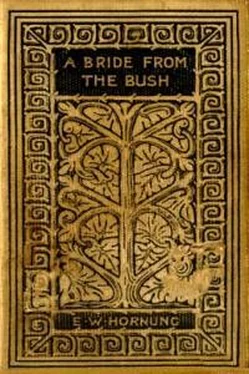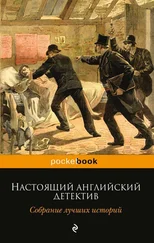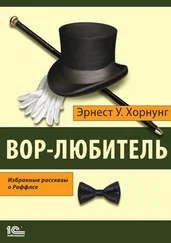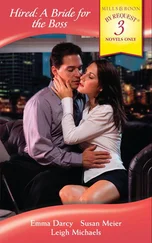Silence ensued, and outlasted the long drive. What afterwards passed between the young husband and wife did not, of course, transpire. There was no further expression of regret than the very equivocal and diluted apology comprehended in the Bride's excuses; indeed, Lady Bligh and her daughter–in–law never spoke that night; nor did Alfred attempt to mediate between them. As a matter of fact, his wife had told him—with a recklessness that cut him to the heart—that, this time, she neither expected nor deserved, nor so much as desired, any one's forgiveness; that now she knew what she had feared before, that she was hopeless; that—but the rest was wild talk.
Next morning, however, Alfred went to Lady Bligh with a letter, one that Gladys had received by the early post. It was an invitation from the Barringtons, the wording of which was sufficiently impulsive and ill–considered. Ada besought her darling Gladys to go stay with them in Suffolk immediately, on the following Saturday, and for as many days as she could and would; and the invitation included the darling's husband in a postscript.
"An extraordinary kind of invitation!" observed Lady Bligh, handing back the letter.
"Ignorance," said Alfred laconically.
"Did you meet the people out there?"
"Only this girl's brother; the others had been in Europe some time. I thought him a very pleasant fellow, I remember, though his contempt for me and for all 'home' birds was magnificent."
"Well," said Lady Bligh, "it is hardly the kind of invitation that Gladys can accept. Is it?"
"She refuses to think of it," Alfred answered, with a frown that rather puzzled Lady Bligh. "But I hope she will change her mind. I wish her to go."
His mother was silent for more than a minute. "Does the letter say Saturday?" she then inquired.
"Yes." Alfred gazed steadily in his mother's face as though he would search her inmost thoughts. "Yes, it says Saturday. And it is on Saturday that the Lord Chief is coming down to stay over Sunday, is it not? I thought so. I very much wish I could induce her to go."
"Not on that account, my boy, I hope?" Lady Bligh seemed slightly embarrassed.
"Partly," said Alfred, speaking firmly and distinctly, but not without an effort; "partly on that account, but by no means altogether."
"She could not go without you," remarked Lady Bligh; "and they do not ask you civilly, to say the least of it."
"She could go without me," returned Alfred emphatically. "What's more, I want her to. It's she that won't hear of it. These are quite old and intimate friends of Gladys and her father. She might easily spend a week with them alone, without me. Mother—I think she would like it so, if only she would go! They are probably free–and–easy, roughish folks, and it would do her good, a week with them. There would be no restraints—nay, she has observed none here, God knows!—but there there might be none to observe. She could do and say what she liked. She would hurt no one's feelings. She would scandalise no one. And—do you know what, mother?—I have got it into my head that when she came back she would see the difference, and appreciate your ways here more than she ever might otherwise. I have got it into my head that one week of that kind, just now, would open her eyes for good and all. And I think—there might be no more relapses! Yes, I thought that before; but I was wrong, you see—after yesterday! Besides, this week would bring us within a few weeks of Scotland; and, after Scotland, we shall have our own little place to go to—I have almost settled upon one. But if I went with her, restraint would go with her too."
His voice had broken more than once with emotion. He commanded it with difficulty, and it became hard and unnatural. In this tone he added:—
"Besides—it would be more comfortable for every one if she were not here with the Lord Chief Justice."
"Do not say that—do not think that!" said Lady Bligh; but faintly, because her heart echoed his sentiment.
"Oh, there's no disguising it—my wife's dynamite!" said Alfred, with a short, harsh laugh. "Only an explosion is worse at one time than at another." He went hastily from the room, neither of them having referred more directly to the scandalous scene in the Park.
He went straight to his wife, to try once more to coax her into accepting the Barringtons' invitation. But it was of no use. She would not listen to him. She would go nowhere without her husband; she should write that to Ada plainly.
Later in the morning, Lady Bligh, of her own deliberate design, came in contact with her daughter–in–law. Gladys attempted escape. Lady Bligh caught her by the hand.
"You are angry, Gladys!"
Gladys said nothing.
"I don't think you are the one to be angry," Lady Bligh said, nettled by the other's sullen manner.
Gladys raised her eyes swiftly from the ground; they were filled with bitterness. "Haven't I a right to be what I like with myself?" she cried. "I am angry with no one else. But I shall never forgive myself—no, nor I won't be forgiven either; I am hopeless! I feared it before; now I know it. Let me go, Lady Bligh!"
She broke away, and found a quiet spot, by–and–by, among the trees by the river.
"If only I were in there !" cried Gladys, out of the tumult of shame and rebellion within her. "In there—or else back in the Bush! And one is possible and easy; and the other is neither!"
By a single grotesque act she had brought her happiness, and not hers alone, to wreck and ruin!
Chapter 13
A Social Infliction
Happily for all concerned, there was something else to be thought about that day: it was the day of Lady Bligh's garden–party.
The British garden–party is possibly unique among the social gatherings of the world. It might be a revelation to most intelligent foreigners. It is held, of course, in the fresh air; the weather, very likely, is all that can be desired. The lawn is soft and smooth and perfectly shaven; sweeping shadows fall athwart it from the fine old trees. The flower–beds are splendidly equipped; their blended odours hover in the air. The leaves whisper and the birds sing. The scene is agreeably English. But let in the actors. They are English too. The hostess on the lawn receiving the people, and slipping them through her busy fingers into solitude and desolation—anywhere, anywhere, out of her way; the stout people in the flimsy chairs, in horrid jeopardy which they alone do not realise; the burly, miserable male supers, in frock–coats and silk hats, standing at ease (but only in a technical sense) around the path, ashamed to eat the ices that the footman proffers them, ashamed of having nobody to talk to but their sisters or wives—who are worse than no one: it is so feeble to be seen speaking only to them . This is the British garden–party in the small garden, in the suburbs. In the large garden, in the country, you may lose yourself among the fruit–trees without being either missed or observed; but this is not a point in favour of the institution. Even in suburban districts there are bold spirits that aspire to make their garden–parties different from everybody else's, and not dull; who write "Lawn Tennis" in the corner of their invitation–cards before ascertaining the respective measurements of a regulation court and of their own back gardens. But beware of these ambitious souls; they add yet another terror to the British garden–party. To go in flannels and find everybody else in broadcloth; to be received as a champion player in consequence, and asked whether you have "entered at Wimbledon"; to be made to play in every set (because you are the only man in flannels), with terrible partners, against adversaries more terrible still—with the toes of the onlookers on the side lines of the court, and the dining–room windows in peril should you but swing back your racket for your usual smashing service, once in a way, to show them how it is done: all this amounts to spending your afternoon in purgatory, in the section reserved for impious lawn–tennis players. Yet nothing is more common. The lawn must be utilised, either for lawn–tennis or for bowls (played with curates), or by the erection of a tent for refreshments. By Granville's intervention, the Blighs had the refreshment–tent.
Читать дальше












